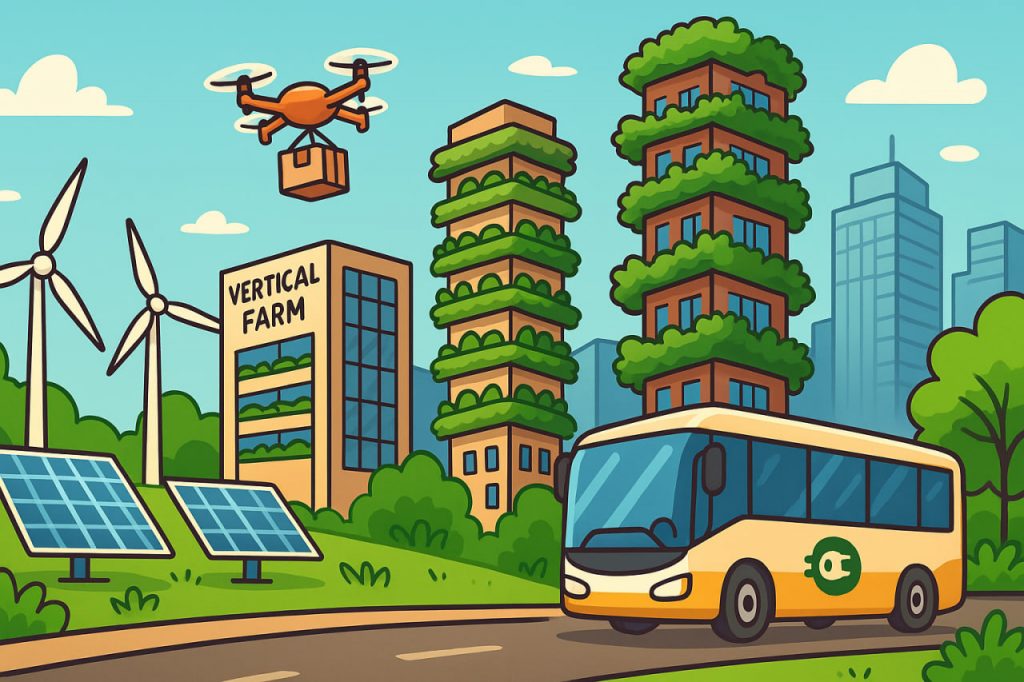Urban environments are undergoing a transformation fueled by eco-technologies designed to reduce environmental impact and improve the quality of life. With the global population increasingly concentrated in cities, the demand for sustainable infrastructure has never been higher. Future cities are expected to incorporate advanced technologies that merge ecology, efficiency, and innovation. From vertical farms to smart grids, these solutions promise to reshape how urban areas consume resources, manage waste, and respond to climate challenges. This article explores the most promising eco-technologies that will likely define cities of the future.
Green Architecture and Vertical Forests
One of the most visible signs of eco-innovation will be found in the design of buildings themselves. Green architecture integrates vegetation directly into construction, including green roofs, living walls, and vertical forests. These features not only reduce energy use through natural insulation but also help filter air pollutants and absorb carbon dioxide (CO₂).
Cities like Milan and Singapore have already introduced high-rise buildings covered in thousands of plants. These structures support urban biodiversity, provide cooling through evapotranspiration, and reduce the urban heat island effect. In the future, green design will likely become a standard in city planning, blending natural elements with modern architecture.
Smart Grids and Renewable Energy Integration
The cities of tomorrow will be powered by smart grids—intelligent electricity networks that balance energy production and consumption in real time. These systems can integrate renewable energy sources like solar, wind, and geothermal power, ensuring cleaner and more resilient energy delivery.
Smart grids allow buildings to act as both consumers and producers of energy through rooftop solar panels and energy storage systems. They also enable dynamic pricing and adaptive energy use, helping to reduce peak demand. Combined with electric vehicle (EV) charging infrastructure, smart grids support a fully electrified and low-emission urban environment.
Water Recycling and Urban Hydrology
Water scarcity is a growing concern, and future eco-cities will deploy technologies to capture, purify, and reuse water. Rainwater harvesting systems, greywater recycling, and permeable pavements are just a few examples of how urban water management is evolving.
Advanced bioswales and constructed wetlands can filter stormwater naturally while creating green public spaces. Cities will also use IoT sensors to monitor water quality and flow in real-time, preventing leaks and optimizing usage. These innovations aim to create circular water systems, minimizing waste and ensuring supply during droughts or floods.
Urban Farming and Food Sustainability
To reduce the ecological footprint of food transport, future cities will invest in urban farming technologies. This includes hydroponic and aeroponic systems housed in vertical farms, which use less water and space while yielding crops year-round.
Integrating food production into urban settings improves food security, lowers emissions from transport, and reconnects citizens with agriculture. These farms can be placed on rooftops, in repurposed warehouses, or even integrated into apartment complexes. Combining agriculture with architecture transforms cities into productive ecosystems.
Waste Management and Circular Economy
Modern eco-cities aim to eliminate the concept of waste through circular economy principles. This means reusing, recycling, and reprocessing materials to extend their lifecycle. Smart bins equipped with sensors can track waste levels, sort recyclables, and optimize collection routes.
Biogas facilities, composting centers, and material recovery facilities (MRFs) will become more common. In addition, building materials will increasingly be designed to be modular and recyclable, reducing the burden on landfills. The ultimate goal is a city that continuously recycles its own materials with minimal external input.
Conclusion
Eco-technologies offer a path toward more sustainable, resilient, and livable cities. As these innovations mature and become more affordable, they will be integrated into the everyday fabric of urban life. The cities of the future will not only be smart—they will be green, efficient, and harmonized with the environment.
Glossary
- Eco-technology — technology designed to support ecological balance and sustainability
- Vertical forest — a high-rise building covered in vegetation to improve air quality and biodiversity
- Smart grid — a digital energy network that manages electricity efficiently and adaptively
- Permeable pavement — pavement that allows water to seep through, reducing runoff
- Greywater — wastewater from sinks, showers, and washing machines that can be reused
- Hydroponics — growing plants without soil, using mineral nutrient solutions
- Circular economy — an economic model focused on reducing waste and reusing materials


